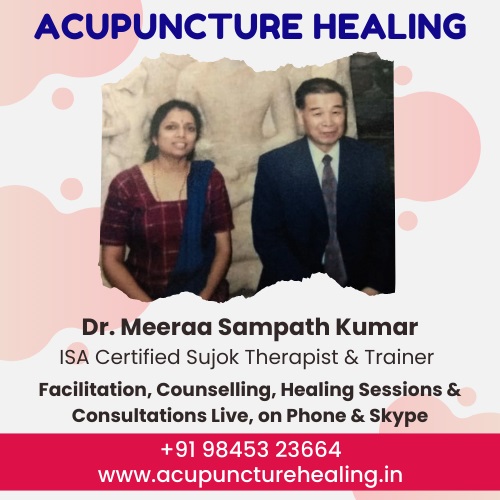Alternative Therapies
- Alternative Medicine
- Access Bars
- Access Consciousness
- Access Body Processes
- Access Energetic Faclift
- Acupressure
- Acupuncture
- Angel Healing
- Ayurveda
- Bach Flower Remedies
- Breathwork
- Cosmetic Acupuncture
- Crystal Healing
- Cupping Therapy
- Emotional Freedom Technique (EFT)
- Ergonomics
- Face Reading
- Fengshui
- Geopathic Stress
- Graphology
- Heal Your Life
- Holistic Solutions
- Holy Fire Reiki
- Homeopathy
- Hypnotherapy
- Jesus Reiki
- Jikiden Reiki
- Lama Fera
- Law of Attraction
- Manual Therapy
- Meditation
- Motivational Counseling
- Mudra Healing
- Nakshatra Energies
- Naturopathy
- Neuro Linguistic Programming (NLP)
- Panchakarma (Ayurveda)
- Panchkarma Holistic Healing - Mind Control
- Past Life Regression
- Physiotherapy
- Pranic Healing
- Pyramids
- Reiki
- Rudraksh
- Silva Mind Control Method
- Sujok therapy
- Switchwords
- Symphony of Possibilities
- Tarot
- Unani Medicine
- Yoga
Diseases & Conditions
- Acne & Pimples
- Allergies
- Arthritis
- Asthma
- Behavioural Disorders
- Dandruff
- Diabetes
- Emotional Problems
- Gallstones
- Gastritis
- Hairloss
- Heart Diseases
- Hormonal Problems
- Hypertension
- Immune Disorders
- Infections
- Infertility
- Jaundice
- Kidney Disorders
- Liver Disorders
- menstrual Disorders
- Migraine
- Neck & Back Pain
- Obesity
- Osteoporosis
- Peptic Ulcer
- Prevention
- Prostate Problems
- Psoriasis
- Sexual Dysfunctions
- Sinusitis
- Sleep Disorders
- Skin Diseases
- Stress
- Thyroid Disorders
- Ulcerative Colitis
- Urinary Infections
General Wellness
Allergy Treatment in Jayanagar
Dr. Annapoorna Bhat

Dr. Annapoorna is an authorised ayurvedic consultant for ISRO - INDIAN SPACE RESEARCH ORGANISATION, Jayanagar since 15 years AND IISc - INDIAN INSTITUTE OF SCIENCE - Jayanagar since 10years. She is also a visiting professor at SRIRAGHAVANDRA AYURVEDA MEDICAL COLLEGE, CHITRADURGA.

Acupuncture Healing - Dr. Meeraa Sampath Kumar

Dr. Meeraa Sampath Kumar is a certified holistic health practitioner and a pioneer in the field of Sujok Acupuncture in Karnataka. Highly trained and experienced, she constantly updates her training skills and knowledge in the field of Sujok Therapy and Onnuri medicine....

ALLERGY

Causes
Allergies are relatively common. Both genetics and environmental factors play a role.The immune system normally protects the body against harmful substances, such as bacteria and viruses. It also reacts to foreign substances called allergens, which are generally harmless and in most people do not cause a problem.
But in a person with allergies, the immune response is oversensitive. When it recognizes an allergen, it releases chemicals such as histamines. which fight off the allergen. This causes itching, swelling, mucus production, muscle spasms, hives, rashes, and other symptoms, which vary from person to person.Common allergens include pollen, mold, pet dander, and dust. Food and drug allergies are common. Allergic reactions can also be caused by insect bites, jewelry, cosmetics, spices, and other substances.Some people have allergy-like reactions to hot or cold temperatures, sunlight, or other environmental triggers. Sometimes, friction (rubbing or roughly stroking the skin) will cause symptoms.
A specific allergy is not usually passed down through families (inherited). However, if both your parents have allergies, you are likely to have allergies. The chance is greater if your mother has allergies. Allergies may make certain medical conditions such as sinus problems, eczema, and asthma worse.
Symptoms
Allergy symptoms vary, but may include:- Breathing problems (coughing, shortness of breath)
- Burning, tearing, or itchy eyes
- Conjunctivitis (red, swollen eyes)
- Coughing
- Diarrhea
- Headache
- Hives
- Itching of the nose, mouth, throat, skin, or any other area
- Runny nose
- Skin rashes
- Stomach cramps
- Vomiting
- Wheezing
What part of the body is contacted by the allergen plays a role in the symptoms you develop.
For example:- Allergens that are breathed in often cause a stuffy nose, itchy nose and throat, mucus production, cough, or wheezing
- Allergens that touch the eyes may cause itchy, watery, red, swollen eyes.
- Eating something you are allergic to can cause nausea, vomiting, abdominal pain, cramping, diarrhea, or a severe, life-threatening reaction
- Allergens that touch the skin can cause a skin rash, hives, itching, blisters, or even skin peeling
- Drug allergies usually involve the whole body and can lead to a variety of symptoms
Treatment
.The best way to reduce symptoms is to try and avoid what causes your allergies in the first place. This is especially important for food and drug allergies. There are several types of alternative medications available to prevent and treat allergies. Which treatment your doctor recommends depends on the type and severity of your symptoms, your age, and overall health.
Specific illnesses that are caused by allergies (such as asthma, hay fever, and eczema) may require other treatments.




